Still have questions? Leave a comment

Checklist: Dissertation Proposal
Enter your email id to get the downloadable right in your inbox!
[contact-form-7 id="12425" title="Checklist: Dissertation Proposal"]
Examples: Edited Papers
Enter your email id to get the downloadable right in your inbox!
[contact-form-7 id="12426" title="Examples: Edited Papers"]Need
Editing and
Proofreading Services?

Your vs. You’re: Learn the Differences with Easy Examples
 May 12, 2025
May 12, 2025 4
min read
4
min read
You’re and your are two of the most commonly confused words by students and professionals. Though their pronunciation is the same, their meanings are different. A big reason for this confusion is the common association of apostrophes with possession, which misleads people into mixing up the two terms. In this article, we’ll explain the meaning and difference between your vs. you’re.
We’ve also given specific examples to help you understand whether to use your or you’re in various phrases. So let’s get started!
Are You Facing Vocabulary Errors? Let Our Editors Help You Write Better. Get Started
What is the difference between your and you’re?
Here’s the difference between you’re vs. your:
Your is a possessive pronoun that shows belonging and ownership. It is derived from the personal pronoun you and is usually used before a noun. ‘Your’ is a possessive form. It indicates ownership, as in the phrase ‘your car’.
This is your book.
I took your book to read.
You’re is a contraction of the words you and are. For example:
You’re not the only one who has problems.
She knows that you’re a senior manager at Deloitte.
The above examples demonstrate the difference between these two homophones. However, you may also have been unsure about whether to use you’re vs. your in certain phrases. Let’s look at some examples of the correct word choice in certain phrases.
Your vs. you’re examples
1. Your welcome or you’re welcome
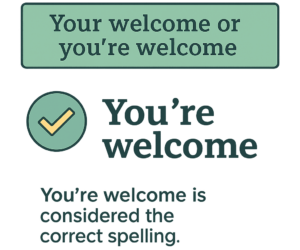
You’re welcome is considered the correct spelling if you’re responding to someone saying thank you, as it is used to express a state of being appreciated. However, if you are describing someone’s welcome, your welcome can be used. Here are some examples to clarify the meaning further:
You’re welcome! I’m happy to help.
Your welcome was grand and memorable.
2. Your right or you’re right
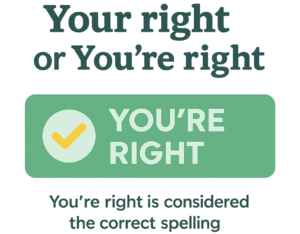
You’re right is regarded as the appropriate spelling if you wish to acknowledge that someone is correct about something. However, your right is the accurate spelling if you are talking about someone’s rights.
You’re right about finishing the foreign assignment first.
Know your rights and avoid getting duped by anyone.
3. Your or you’re beautiful
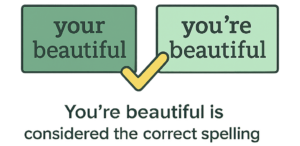
You’re beautiful is correct as a standalone phrase. However, if you are referring to someone’s beauty in a sentence, your beautiful is the right phrase. If you wish to use the contracted form of you and are, you’re beautiful is the right usage.
You’re beautiful!
You don’t know you’re beautiful!
Your beautiful eyes reminded me of a famous dancer.
4. Your good or you’re good
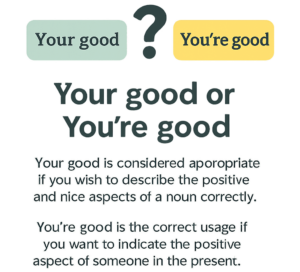
Your good is considered appropriate if you wish to describe the positive and nice aspects of a noun. You’re good is the correct usage if you want to indicate the positive aspect of someone in the present.
Your good jacket has been spoiled.
I know that you’re good people.
5. Your pretty or you’re pretty
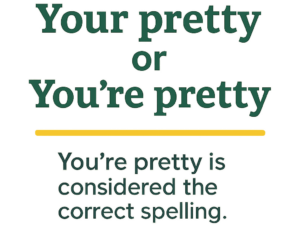
You’re pretty as a standalone phrase is the correct usage. However, if you wish to commend the beauty of a noun in a sentence, your pretty is the right usage. Here are some your and you’re examples of this phrase:
You’re pretty!
Raj said that you’re pretty.
I love your pretty bag.
6. Your the best or you’re the best

You’re the best is widely accepted as the right usage. Your the best is the incorrect phrase which should not be used.
You’re the best friend in the world.
He thinks that you’re the best artist in the class.
To determine if ‘you’re’ is correct, replace it with ‘you are’ and see if the sentence still makes sense.
7. Your honor or you’re honor
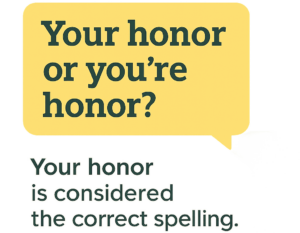
Your honor is considered the correct usage by dictionaries worldwide. When addressing someone, your honor means respect and high esteem. Your Honor is also used as a term to address the judge in judicial courts. You’re honor is regarded as the incorrect spelling.
I rest my case, Your Honor.
Don’t compromise on your honor.
8. Your not or you’re not
You’re not is the right phrase that must be used. Your not is the wrong usage. ‘You’re’ combines the pronoun ‘you’ with the verb ‘are’.
You’re not responsible for his mistakes.
She hopes that you’re not influenced by the wrong crowd.
Now that we’ve seen your vs. you’re examples, a question arises: When to use your and you’re? Let’s find out!
When to use your and you’re
If you want to show how something belongs to or is associated with someone, “your” is the correct usage. However, if you wish to use the shorter form of you and are to communicate about someone in the present, use you’re.
We hope this article has resolved all your doubts about your vs. you’re. There are also many other commonly confused homophones like their and there, to, two, and too. To remember the difference between such homophones, you can create mnemonics and jot down simple sentences with these homophones. This will help to remember the meanings of homophones.
As experts in providing editing and proofreading services, we’d love to make your job easier and help you understand concepts better. Go through our list of resources to avoid making common grammar and word choice errors!
- 10 Most Common Grammar Mistakes & How to Avoid Them
- Who vs. Whom: When to Use Which [& Why It’s Important]
- Its vs. It’s: When to Use Its and It’s in a Sentence
- Affect vs. Effect: Meaning, Difference, & Examples
- Em Dash vs. En Dash vs. Hyphen: When to Use Which
- Ms. vs. Mrs. vs. Miss vs. Mx. | Uses and Pronunciations

Rishi

Rishi was a zealous student at IIT Bombay when he realized, firsthand, the power of good language in effective communication. As part of this belief, after a brief stint in a hedge fund, he co-founded PaperTrue in 2014.
One comment on “Your vs. You’re: Learn the Differences with Easy Examples”
Comments are closed.
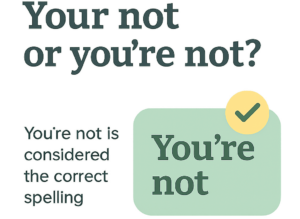




You’re kind to give us this proper information regarding your and you’re.